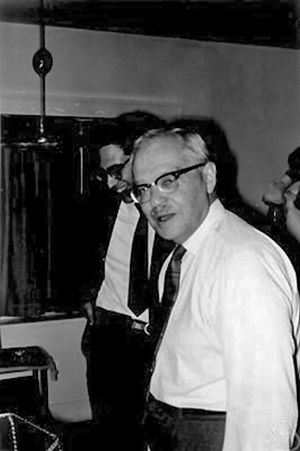Jerzy Neyman facts for kids
Quick facts for kids
Jerzy Neyman
|
|
|---|---|
 |
|
| Born |
Jerzy Spława-Neyman
April 16, 1894 Bendery, Bessarabia Governorate, Russian Empire (now Bender, Moldova)
|
| Died | August 5, 1981 (aged 87) Oakland, California, US
|
| Nationality | Polish |
| Alma mater | University of Warsaw Kharkov University |
| Known for | Neyman construction Neyman–Pearson lemma Neyman–Rubin causal model Fisher–Neyman factorization theorem Confidence interval Hypothesis testing Statistics of galaxy clusters |
| Awards | Newcomb Cleveland Prize (1958) Guy Medal (Gold, 1966) National Medal of Science (1968) Fellow of the Royal Society |
| Scientific career | |
| Fields | Mathematics |
| Institutions | Nencki Institute of Experimental Biology University College London University of California, Berkeley |
| Doctoral advisor | Wacław Sierpiński |
| Doctoral students | George Dantzig Lucien Le Cam Evelyn Fix Erich Leo Lehmann Joseph Hodges Pao-Lu Hsu |
Jerzy Neyman (born Jerzy Spława-Neyman) was a very important Polish mathematician and statistician. He lived from April 16, 1894, to August 5, 1981. He worked in Warsaw, Poland, then at University College London, and later at the University of California, Berkeley.
Neyman helped create some of the most important ideas in statistics. He introduced the modern idea of a confidence interval. This is a range that helps scientists be more sure about their findings. He also worked with Egon Pearson to improve how scientists test their ideas, a process called statistical hypothesis testing.
Contents
Early Life and Education
Jerzy Neyman was born into a Polish family in Bendery, which was part of the Russian Empire at the time. He was the youngest of four children. His family was Roman Catholic, and Jerzy was an altar boy when he was young. Later in life, he became an agnostic, meaning he wasn't sure about religious beliefs.
His family had a long history of Polish nobles and military heroes. In 1909, he finished high school in Kamieniec Podolski. He started studying at Kharkiv University in 1912. There, he learned from a Ukrainian expert in probability, Sergei Natanovich Bernstein. He became very interested in mathematics after reading a book by Henri Lebesgue.
Return to Poland and Early Work
In 1921, Jerzy Neyman returned to Poland. He had been a POW (prisoner of war) during the Polish-Soviet War. He earned his PhD in 1924 from the University of Warsaw. His main topic was how to use probability theory in farming experiments.
After his PhD, he spent time in London and Paris. He studied statistics with famous mathematicians like Karl Pearson and Émile Borel. When he came back to Poland, he set up the Biometric Laboratory. This lab was at the Nencki Institute of Experimental Biology in Warsaw.
Big Ideas in Statistics
Jerzy Neyman wrote many books about experiments and statistics. He even helped create the way the FDA tests new medicines today.
He suggested and studied randomized experiments in 1923. This means that people or things in a study are chosen randomly. This helps make sure the results are fair.
In 1934, he gave an important speech about how to choose samples for studies. He talked about stratified sampling. This is a way to divide a group into smaller, similar groups before picking samples. This talk led to how we do modern scientific sampling today.
In 1937, he introduced the idea of the confidence interval. This is a range that helps scientists say how sure they are about their results. For example, if you measure something, a confidence interval tells you a range where the true value most likely falls.
Another very important idea he developed was the Neyman–Pearson lemma. This is a key part of hypothesis testing. Hypothesis testing is how scientists decide if their ideas or theories are likely to be true based on data.
Later Career and Awards
In 1938, Jerzy Neyman moved to Berkeley, California. He worked at the University of California, Berkeley for the rest of his life. He guided 39 students who earned their PhDs under his teaching.
He received many important awards for his work.
- In 1966, he was given the Guy Medal from the Royal Statistical Society.
- Three years later, in 1969, he received the U.S. National Medal of Science. This is one of the highest honors for scientists in the United States.
Jerzy Neyman passed away in Oakland, California in 1981. His ideas continue to be very important in many areas of science and research today.
See also
- List of Poles
 | Chris Smalls |
 | Fred Hampton |
 | Ralph Abernathy |

